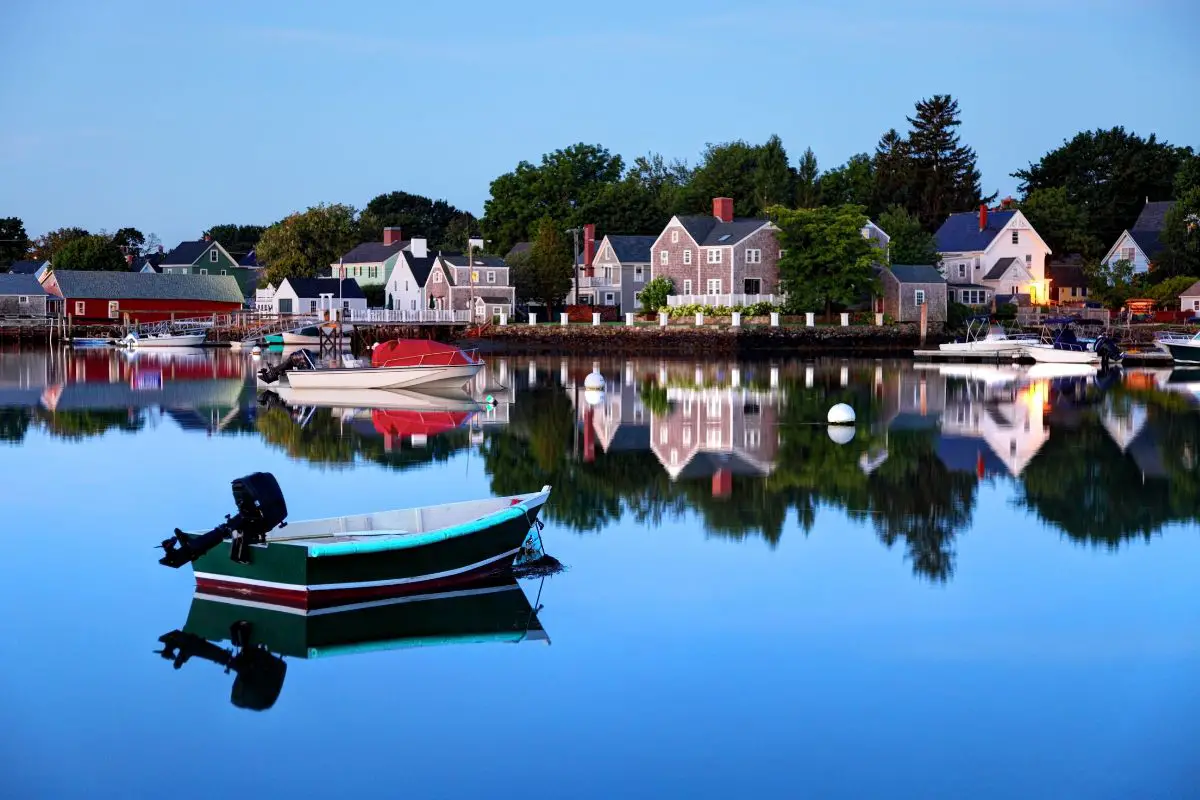New Hampshire is a state in New England, a region of the United States in the country’s far North East. The state is bordered by several other New England states.
These include Massachusetts, New England’s most populous state, to the south, Maine to the east, and Vermont to the west. The state also borders the Atlantic Ocean’s Gulf of Maine on its east coast.
New Hampshire borders the neighboring country of Canada to the north, specifically the Canadian province of Quebec.
The state of New Hampshire is known as the ‘Granite State’ due to its widespread granite formations and quarrying history.
The state’s motto ‘Live Free or Die’ is perhaps the best-known state motto in the United States, in large part because it pays homage to the ideals of the American Revolution.
As one of the smaller states, New Hampshire does not receive a great deal of interest in the national press.
It is probably best known for being the home of the nation’s first presidential primary, which takes place after the Iowa Caucus.
But what else is there to know about the Granite State? In this article, we’ll be focusing on the state’s population.
What Is The Population Of New Hampshire?
Of the 50 US states, New Hampshire is one of the smallest in terms of both geographical size and population size. The state is the fifth smallest in terms of area, whilst it is the tenth least populous.
According to the 2020 United States Census, the population of New Hampshire is 1,377,529. This represents an increase of 4.6% since the 2010 United States Census.

This also means that the population of New Hampshire has more than doubled in the last 60 years, with the 1960 U.S. census reporting a population of just 606,921.
A total of 1,377,529 residents also makes New Hampshire slightly larger than Maine, with 1,362,359 residents, which it leapfrogged in terms of population size between the 2010 and 2020 censuses.
This also makes New Hampshire slightly smaller than Hawaii in terms of population, which has 1,455,271 residents.
New Hampshire’s Biggest Cities And Towns
The capital city of New Hampshire is Concord. As with several other states, New Hampshire’s capital is not its most populous city.
In fact, Concord, which is the county seat of Merrimack County, is the third largest city in the state behind Manchester and Nashua. Concord has a population of 43,976 according to the most recent census.
Manchester is the state of New Hampshire’s largest city with a total of 115,644 inhabitants.
This also makes it the largest city in northern New England, which comprises the states of Maine, Vermont, and New Hampshire.
It shares the status of county seat for Hillsborough County with Nashua, which is New Hampshire’s second-largest city and the second largest in northern New England.
Nashua has a population of 91,332 according to the 2020 U.S. census, and lies under 20 miles down the highway from Manchester.
New Hampshire’s Center Of Population
New Hampshire’s center of population has gradually drifted south since the 1950s, reflecting the fact that the bulk of the State’s population growth has been concentrated on the state’s southern border with Massachusetts.
The population of the state has been gradually shifting southward to be within commuting distance of Greater Boston.
New Hampshire’s center of population is currently located in the town of Pembroke, in Merrimack County. Despite being the geographic center of population, Pembroke is still within the state’s southern third.
The vast majority of the state’s population is concentrated in two areas. The Merrimack River valley, where the State’s largest cities of Manchester and Nashua are located, and on the eastern coast around the Gulf of Maine.
Hillsborough County alone, home to the state’s two largest cities, accounts for approximately 30% of the state’s total population.
The other three counties, along with Hillsborough, that cover the state’s most densely populated regions account for 72% of the population.
Much of the North and West of the state are extremely sparsely populated.
Only the town of Keene, the county seat of the Cheshire County in the state’s southwest, has more than 20,000 inhabitants in the entire rest of the state outside the main population hubs.
The northern county of Coos is the largest in New Hampshire by area and covers the northern quarter of the state, but has just 31,000 residents, 10,000 of whom live in a single community (Berlin).
New Hampshire Demographics
The states of northern New England are amongst the whitest in the nation. Maine has the greatest percentage of non-Hispanic white residents at 90.2% according to the 2020 census.
Vermont comes second with West Virginia third, and New Hampshire isn’t far behind in fourth place with a white population that stands at 87.2% of the total.
African American inhabitants of the state make up roughly 1.8% of the population, Asians make up 3%, and Hispanics of any race account for 4%. Approximately 1.8% of the population identified as mixed race whilst a further 0.3% reported that they were ‘American Indians or Alaska Natives’.
Due to the state’s close proximity to Canada, New Hampshire has the highest percentage of people of French Canadian/Acadian descent of any U.S. state at 22.9%.
Religion
New Hampshire natives are amongst the country’s least religious. Polls have consistently found that New Hampshirites are less likely to describe themselves as very religious- only 20% in a 2016 poll, compared against a nationwide average of 40%.
A plurality of residents, 36%, describe themselves as religiously unaffiliated. 30% identify themselves as Protestant, a further 26% as Catholic, and 2% respectively reported they were Jews or followers of ‘Other Christian’ denominations. About 1% of New Hampshire residents are Mormons.
Summary
New Hampshire is one of the smallest states by size, and similarly has one of the smallest populations at just shy of 1.4 million people. The population is heavily concentrated in the state’s south and southeast, and is also much whiter than the national average.



